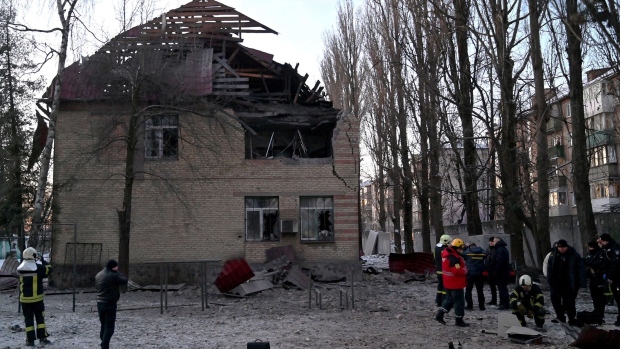Dec 15, 2022
EU Nations Back Russia Sanctions on Drone Imports, Banks
, Bloomberg News

(Bloomberg) -- European Union member states reached a deal on a ninth package of sanctions on Russia over its invasion of Ukraine, targeting Moscow’s access to drones, additional banks as well as officials responsible for allegedly abducting children from Ukraine.
The measures, which enter into force once published in the EU’s official journal, were agreed by the bloc’s ambassadors Thursday evening and impact more than 100 individuals and dozens of entities, according to documents seen by Bloomberg. The EU also agreed to ban direct exports of drone engines to Russia or third countries, such as Iran, which could then supply drones to Russia.
The sanctions will target three banks — the Russian Regional Development Bank, Credit Bank of Moscow and Dalnevostochny Bank — four media outlets, export restrictions on more chemicals and technologies used for military purposes, as well as goods, including several types of hard drives, radio-navigation equipment, generators, computers, laptops, cameras and lenses, and more than 100 individuals and entities.
Among those set to be sanctioned are family members and associates of both Yury Kovalchuk, a long-time acquaintance of President Vladimir Putin, and the head of Chechnya Ramzan Kadyrov, according to one of the documents. Also on the list are military personnel involved in missile planning units, constitutional court judges, Putin’s economic aide Maxim Oreshkin, political parties as well as dozens more politicians, media executives, army officials and military entities, including the national guard, the armed forces and its main intelligence directorate.
The EU is also set to sanction Valentina Tereshkova, a member of Russia’s parliament who was the first woman in space, and Oscar winner Nikita Mikhalkov, who is a prominent pro-Putin TV commentator, the document shows.
In addition, the measures are due to hit officials and governors allegedly involved in the transportation of Ukrainian children to Russia, and officials involved in the seizure of Ukrainian agricultural products. Russia denies the children have been abducted, saying they have been relocated for their own protection.
Mining Sector
The latest package of sanctions will also ban new investments in Russia’s mining sector, with the exception of activities involving certain critical raw materials.
The sanctions could change before they are formally adopted on Friday. Hungarian Foreign Minister Peter Szijjarto said earlier this week that his government had lobbied the EU to remove some Russian officials from the next round of sanctions.
As part of discussions on Thursday evening, EU member states discussed a mechanism to carve out specific exemptions, on a case-by-case basis, for a small number of previously sanctioned individuals and entities significantly involved in food-related deals, the people said. Transactions can also be rejected for national security reasons. Guidance will be provided outlining what persons and entities would qualify as significant.
--With assistance from Natalia Drozdiak, Aaron Eglitis, Slav Okov and Tony Halpin.
(Updates with details on individuals in fifth paragraph)
©2022 Bloomberg L.P.





